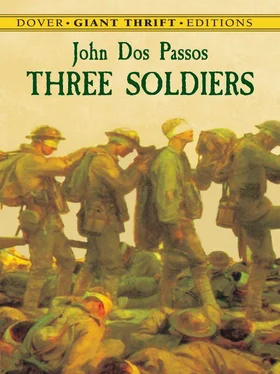“I’m going to Poland tomorrow.”
“How?”
“As guard on a Red Cross supply train. I think you might make it if you want to come, if we beat it right over to the Red Cross before Major Smithers goes. Or we might take him out to dinner.”
“But, Henny, I’m staying.”
“Why the hell stay in this hole?”
“I like it. I’m getting a better course in orchestration than I imagined existed, and I met a girl the other day, and I’m crazy over Paris.”
“If you go and get entangled, I swear I’ll beat your head in with a Polish shillaughly… Of course you’ve met a girl-so have I-lots. We can meet some more in Poland and dance polonaises with them.”
“No, but this girl’s charming… You’ve seen her. She’s the girl who was with the poilu at the Rat qui Danse the first night I was in Paris. We went to Louise together.”
“Must have been a grand sentimental party… I swear… I may run after a Jane now and again but I never let them interfere with the business of existence,” muttered Henslowe crossly.
They were both silent.
“You’ll be as bad as Heinz with his Moki and the lion cub named Bubu… By the way, it’s dead… Well, where shall we have dinner?”
“I’m dining with Jeanne… I’m going to meet her in half an hour… I’m awfully sorry, Henny. We might all dine together.”
“A fat chance! No, I’ll have to go and find that ass Aubrey, and hear all about the Peace Conference… Heinz can’t leave Moki because she’s having hysterics on account of Bubu. I’ll probably be driven to going to see Berthe in the end… You’re a nice one.”
“We’ll have a grand seeing-off party for you tomorrow, Henny.”
“Look! I forgot! You’re to meet Aubrey at the Crillon at five tomorrow, and he’s going to take you to see Geneviève Rod?”
“Who the hell’s Geneviève Rod?”
“Darned if I know. But Aubrey said you’d got to come. She is an intellectual, so Aubrey says.”
“That’s the last thing I want to meet.”
“Well, you can’t help youself. So long!”
Andrews sat a while more at the table outside the café. A cold wind was blowing. The sky was blue-black and the ashen white arc lamps cast a mortuary light over everything. In the Colonnade of the Palais Royal the shadows were harsh and inky. In the square the people were gradually thinning. The lights in the Magazin du Louvre had gone out. From the café behind him, a faint smell of fresh-cooked food began to saturate the cold air of the street.
Then he saw Jeanne advancing across the ash-grey pavement of the square, slim and black under the arc lights. He ran to meet her.
The cylindrical stove in the middle of the floor roared softly. In front of it the white cat was rolled into a fluffy ball in which ears and nose made tiny splashes of pink like those at the tips of the petals of certain white roses. One side of the stove at the table against the window, sat an old brown man with a bright red stain on each cheek bone, who wore formless corduroy clothes, the color of his skin. Holding the small spoon in a knotted hand he was stirring slowly and continuously a liquid that was yellow and steamed in a glass. Behind him was the window with sleet beating against it in the leaden light of a wintry afternoon. The other side of the stove was a zinc bar with yellow bottles and green bottles and a water spigot with a neck like a giraffe’s that rose out of the bar beside a varnished wood pillar that made the decoration of the corner, with a terra cotta pot of ferns on top of it. From where Andrews sat on the padded bench at the back of the room the fern fronds made a black lacework against the left-hand side of the window, while against the other was the brown silhouette of the old man’s head, and the slant of his cap. The stove hid the door and the white cat, round and symmetrical, formed the center of the visible universe.
On the marble table beside Andrews were some pieces of crisp bread with butter on them, a saucer of damson jam and a bowl with coffee and hot milk from which the steam rose in a faint spiral. His tunic was unbuttoned and he rested his head on his two hands, staring through his fingers at a thick pile of ruled paper full of hastily drawn signs, some in ink and some in pencil, where now and then he made a mark with a pencil. At the other edge of the pile of papers were two books, one yellow and one white with coffee stains on it.
The fire roared and the cat slept and the old brown man stirred and stirred, rarely stopping for a moment to lift the glass to his lips. Occasionally the scratching of sleet upon the windows became audible, or there was a distant sound of dish pans through the door in the back.
The sallow-faced clock that hung above the mirror that backed the bar, jerked out one jingly strike, a half hour. Andrews did not look up. The cat still slept in front of the stove which roared with a gentle singsong. The old brown man still stirred the yellow liquid in his glass. The clock was ticking uphill towards the hour.
Andrews’s hands were cold. There was a nervous flutter in his wrists and in his chest. Inside of him was a great rift of light, infinitely vast and infinitely distant. Through it sounds poured from somewhere, so that he trembled with them to his finger tips, sounds modulated into rhythms that washed back and forth and crossed each other like sea waves in a cove, sounds clotted into harmonies.
Behind everything the Queen of Sheba, out of Flaubert, held her fantastic hand with its long, gilded finger nails on his shoulder; and he was leaning forward over the brink of life. But the image was vague, like a shadow cast on the brilliance of his mind.
The clock struck four.
The white fluffy ball of the cat unrolled very slowly. Its eyes were very round and yellow. It put first one leg and then the other out before it on the tiled floor, spreading wide the pinkey-grey claws. Its tail rose up behind it straight as the mast of a ship. With slow processional steps the cat walked towards the door.
The old brown man drank down the yellow liquid and smacked his lips twice, loudly, meditatively.
Andrews raised his head, his blue eyes looking straight before him without seeing anything. Dropping the pencil, he leaned back against the wall and stretched his arms out. Taking the coffee bowl between his two hands, he drank a little. It was cold. He piled some jam on a piece of bread and ate it, licking a little off his fingers afterwards. Then he looked towards the old brown man and said:
“On est bien ici, n’est ce pas, Monsieur Morue?”
“Oui, on est bien ici,” said the old brown man in a voice so gruff it seemed to rattle. Very slowly he got to his feet.
“Good. I am going to the barge,” he said. Then he called, “Chipette!”
“Oui, m’sieu.”
A little girl in a black apron with her hair in two tight pigtails that stood out behind her tiny bullet head as she ran, came through the door from the back part of the house.
“There, give that to your mother,” said the old brown man, putting some coppers in her hand.
“Oui, m’sieu.”
“You’ld better stay here where it’s warm,” said Andrews yawning.
“I have to work. It’s only soldiers don’t have to work,” rattled the old brown man.
When the door opened a gust of raw air circled about the wine shop, and a roar of wind and hiss of sleet came from the slush-covered quai outside. The cat took refuge beside the stove, with its back up and its tail waving. The door closed and the old brown man’s silhouette, slanted against the wind, crossed the grey oblong of the window.
Andrews settled down to work again.
“But you work a lot a lot, don’t you; M’sieu Jean?” said Chipette, putting her chin on the table beside the books and looking up into his eyes with little eyes like black beads.
Читать дальше












